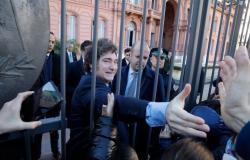
Hear
BARCELONA.- The Popular Party (PP) achieved a clear victory on Sunday over the socialist party of Pedro Sanchez in a European election in which, as happened in many European countries, there was an increase in support for far-right parties. The formation of Alberto Núñez Feijóo won four points ahead of the PSOE, a noticeable improvement compared to the 1.40 points it earned in the general elections almost a year ago. However, The turnout this time was much lower.close to 50%, so it is difficult to extrapolate these results to those of general ones.
The PSOE, in recent days, had resorted to a football simile to define the elections and had spoken of a “comeback”, referring to the fact that just three months ago, before the Catalan elections, The polls predicted a victory for the PP of up to seven points. Although, certainly, the socialists have improved these forecasts, they have fallen far short of the technical tie they aspired to. In any case, His defeat is not large enough to force an electoral advanceas has happened in France, and which was Feijóo’s great objective.
As he did in last year’s general elections, Sánchez’s main argument before the electorate was to present himself as the bastion of progress against the extreme right. But this time his strategy consisted of seeking hand-to-hand combat with a foreign leader, the Argentine president, Javier Milei, become a kind of symbol of the global extreme right. The campaign opened with controversy over Milei’s accusation of Sánchez’s wife, Begoña Gómez, being “corrupt” during a visit to Spain. And it concluded at a rally in which Sánchez once again brought up Milei, an unequivocal sign that he believed that she favored him electorally: “The dilemma is clear. “Either we are with social justice or we are with Milei.”
With all the votes practically counted, The PP obtained 34% of the votes and 22 seats in the European Parliament, by 30% and 20 seats for the PSOE. VOX consolidates itself as the third force in the country, reaching close to 10% of the votes and adding six seats, two more than in 2019. The good result of the extreme right in Spain is completed with the emergence of a new formation, “It’s over the party”, by influencer Alvise Pérez, who will enter the European Parliament with 3 deputies and 4.5% of the votes.
For its part, the Spanish left, which presented itself divided between Addthe party and Yolanda Díaz, and Podemosled by former minister Irene Montero, recorded a slight drop. While in 2019 with a single list they achieved 6 MEPs, this time it will be one less. Sumar won three deputies, for two of his former party colleagues. Above Sumar in votes, the coalition of the peripheral nationalist left (Esquerra Republicana, Bildu and BNG) that won three deputies, followed by Junts and the PNV, with one seat each.
An hour after knowing the result, Núñez Feijóo appeared before the press to assess the results and was euphoric. “The results are the best results [para el PP] in European elections in the last 25 years… A new political cycle has begun in Spain”said Feijóo proudly, pointing out that all of Sánchez’s partners in the Congress of Deputies lost support in this race. During his speech at the party headquarters, PP cadres and leaders chanted “President, president!”
With his victory, Feijóo can boast that his strategy of “nationalizing” the campaign, avoiding addressing debates related to the European Union, has worked. The PP chose to raise the contest as a plebiscite on Sánchez putting at the center the issue of amnesty for Catalan leaders and activists, the price that the former Catalan president in exile, Carles Puigdemont, set to support Sánchez’s investiture. The measure was definitively approved on May 30, that is, in the middle of the campaign.
Unlike Feijóo, Sánchez did not appear before the press, although he did play a very active role during the campaign. Former minister Teresa Ribera, PSOE’s headliner in the European elections, was in charge of offering the PSOE’s perspective. “We are the party in government of all European countries with the best results”said Ribera, trying to find a positive interpretation of the results, which he described as “magnificent.” Ribera boasted that the PSOE is “the retaining wall of the extreme right,” and accused the PP’s speech of having led to the increase of this political space.
With these European elections, a very long electoral cycle ends in Spain that began a year ago with the municipal elections, continued with the general elections, and then with the Galician, Basque and Catalan elections. In theory, a long period of three years without electoral contests now opens, as long as Sánchez manages to consolidate his heterogeneous government majority. His next challenge will be to approve next year’s budget, after having extended those for 2024 due to a continuous state of electoral campaign.





